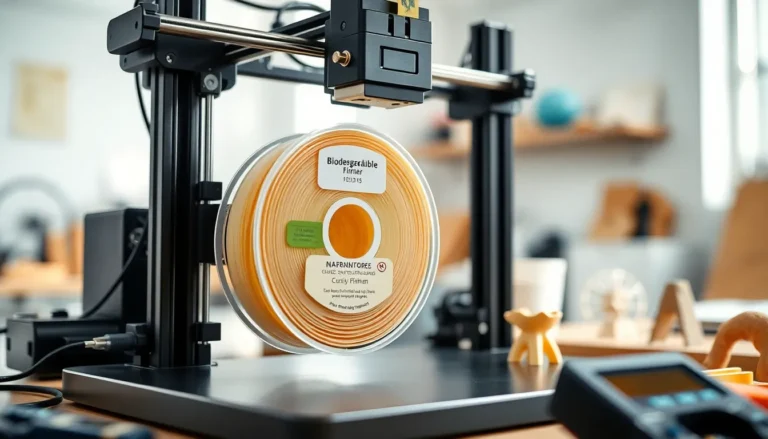In a world where technology evolves at lightning speed, the concept of technology companions is gaining traction. These digital allies, from smart assistants to advanced AI systems, are designed to enhance everyday life and streamline tasks. As people increasingly rely on these tools for support, understanding their role becomes essential.
Technology companions aren’t just about convenience; they foster connections and improve productivity. By analyzing user behavior and preferences, they adapt to individual needs, creating a personalized experience. From managing schedules to providing instant information, these companions are transforming how people interact with technology and each other. Embracing this shift can lead to a more efficient and enjoyable lifestyle, making it crucial to explore the benefits and implications of these innovative tools.
Table of Contents
ToggleWhat Are Technology Companions?
Technology companions are digital tools designed to assist users in daily tasks and enhance interactions with technology. These companions include smart assistants, such as Amazon Alexa, Google Assistant, and Apple’s Siri, which offer voice-activated support. They personalize experiences through user preferences and behavior analysis, adapting to individual needs.
Technology companions also encompass advanced AI systems that provide recommendations, manage schedules, and deliver real-time information. Devices like smartwatches and health monitors act as companions too, offering insights into fitness and well-being.
These technologies improve productivity, convenience, and connectivity, transforming how individuals communicate and complete tasks. They often integrate with various applications to streamline workflows, enabling a seamless user experience across devices. Their role in the evolving digital landscape emphasizes the significance of understanding their functionality and impact on everyday life.
Types of Technology Companions

Technology companions encompass various tools that enhance daily activities and improve user interactions with technology. The following categories illustrate their significance and functionality.
Smart Home Devices
Smart home devices automate and streamline daily tasks within homes. Examples include smart thermostats like Nest and smart lighting systems such as Philips Hue. These devices connect to Wi-Fi, allowing remote control through smartphones or voice commands. They offer energy efficiency through schedule adjustments and monitoring usage patterns. Integration with systems like Amazon Alexa or Google Assistant enables seamless management of multiple devices, enhancing convenience and security.
Personal Assistants
Personal assistants like Siri, Google Assistant, and Amazon Alexa serve as virtual helpers for individual users. These AI-powered systems respond to voice commands, manage calendars, set reminders, and answer questions in real time. They personalize user interactions by learning preferences over time. Integration with smart home devices and third-party applications extends their functionality, making them versatile companions for managing daily routines and enhancing productivity.
Wearable Technology
Wearable technology, including smartwatches and fitness trackers, monitors health and daily activities. Devices like the Apple Watch and Fitbit provide insights into step counts, heart rates, and sleep patterns. Users can set health goals and receive alerts, increasing motivation for physical activity. Many wearables sync with smartphones, offering notifications and app integration, enhancing overall connectivity and convenience. These technologies promote healthy habits while keeping users informed and engaged in their wellness journey.
Benefits of Technology Companions
Technology companions provide significant benefits that enhance daily life. They streamline tasks, improve connections, and adapt to individual user needs, ensuring a more efficient experience.
Enhanced Convenience
Enhanced convenience arises from technology companions managing various aspects of daily routines. These tools automate tasks like setting reminders, controlling home devices, and retrieving information swiftly. Smart assistants can answer queries, play music, or make purchases, saving users valuable time and effort. For instance, a smart thermostat can adjust the temperature automatically, ensuring a comfortable environment without manual adjustments. This level of automation minimizes the cognitive load, allowing individuals to focus on more important tasks.
Improved Connectivity
Improved connectivity is another key benefit of technology companions. These devices facilitate seamless communication between people through messaging apps, video calls, and social media integration. Features like calendar syncing and reminders ensure users stay connected with family, friends, and colleagues. Wearable technology, such as smartwatches, alerts users to notifications and fitness updates in real time, encouraging active engagement. By fostering connections and enhancing communication, technology companions create a more connected lifestyle.
Challenges and Concerns
Technology companions, while beneficial, present various challenges and concerns that require attention. Understanding these issues is essential to navigate their influence on daily life.
Privacy Issues
Privacy concerns arise with technology companions that collect and store personal data. Devices like smart assistants and wearable technology often require constant connectivity, increasing the risk of unauthorized access to sensitive information. For instance, Amazon Alexa and Google Assistant maintain voice recordings for improved accuracy, but this data retention practices can lead to potential misuse or breaches. Users should be aware of the privacy settings available and regularly review them to protect their information from potential threats.
Dependence on Technology
Dependence on technology companions can lead to diminished critical thinking and problem-solving skills. Relying on smart assistants for answers can reduce memory retention and cognitive engagement in daily tasks. Moreover, excessive use of wearable fitness trackers may cause individuals to fixate on metrics rather than enjoying physical activities. Striking a balance between leveraging technology for convenience and maintaining independence is crucial to prevent overreliance on these digital tools.
Technology companions are reshaping the way individuals navigate their daily lives. By providing personalized support and enhancing connectivity, these tools offer a unique blend of convenience and efficiency. As they continue to evolve, understanding their benefits and potential pitfalls becomes essential.
Balancing the advantages of these digital assistants with awareness of privacy concerns and cognitive engagement will empower users to make informed choices. Embracing technology companions can lead to a more streamlined and connected lifestyle, enhancing overall well-being and productivity. The journey ahead promises exciting developments in how these tools integrate into everyday life.




